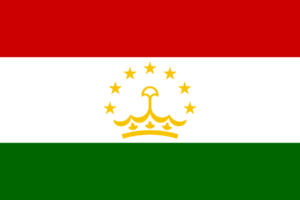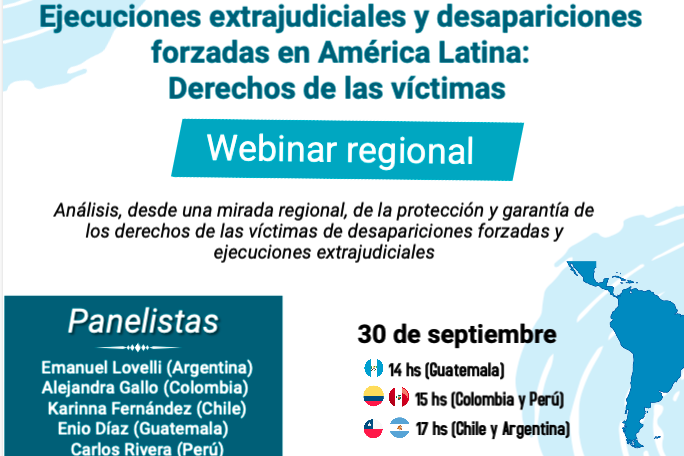
Sep 30, 2020 | Events, News
For decades, victims of enforced disappearances and extrajudicial killings in Latin America have been demanding justice, truth, and reparations. Despite these efforts, impunity remains rampant. In some cases, victims have been waiting for justice for over four decades.
As a part of its strategy to promote accountability for serious human rights violations around the world, the ICJ, together with partners, is implementing a regional project to address justice for extrajudicial killings and enforced disappearances in Colombia, Guatemala, and Peru, supported by the European Union.
One of the results of the project has been to support the production of three case dossiers by the ICJ’s local partners.
In Colombia, to illustrate one of the patterns of extrajudicial killings, the Asociación de Red Defensores y Defensoras de Derechos Humanos (dhColombia) produced a document concerning three cases of extrajudicial killings committed during 2006 and 2008.
The report Una práctica sistemática ejecuciones extrajudiciales en el eje cafetero (2006-2008) presents the challenges the victims and their lawyers have faced when seeking responsibility for those crimes.
In Peru, the Instituto de Defensa Legal (IDL) documented the enforced disappearances of university students and professors between 1989 to 1993, at the height of the internal conflict. In the report Los desaparecidos de la Universidad Nacional del Centro IDL describes the difficult legal path victims have faced in order to bring state agents suspected of committing crimes to justice.
In Guatemala, to highlight the manner in which enforced disappearances were committed against rural communities during the internal armed conflict, the Asociación de Familiares de Detenidos-Desaparecidos de Guatemala (Famdegua) wrote about the enforced disappearance of more than 500 people in the region of the Veparaces. In the report Las desapariciones forzadas en la región de las Verapaces the story of five cases is presented.
These three reports contribute towards understanding the prevalence of these violations in Latin America, and the available options to tackle impunity.
On 30 September 2020, the ICJ will host a regional webinar to discuss the protection and guarantee of the rights of victims of enforced disappearances and extrajudicial executions in Argentina, Colombia, Chile, Guatemala and Peru.
The webinar will be broadcast live on the ICJ’s Facebook page, at 14 hours (Guatemala time)/15 hours (Colombia and Peru time)/ 17 hours (Chile and Argentina time).
Contact
Kingsley Abbott, Coordinator of the Global Accountability Initiative, e: kingsley.abbott@icj.org
Carolina Villadiego Burbano, Legal and Policy Adviser, Latin America and Regional Coordinator of the Project, e: carolina.villadiego@icj.org
Rocío Quintero M, Legal Adviser, Latin America, e: rocio.quintero@icj.org
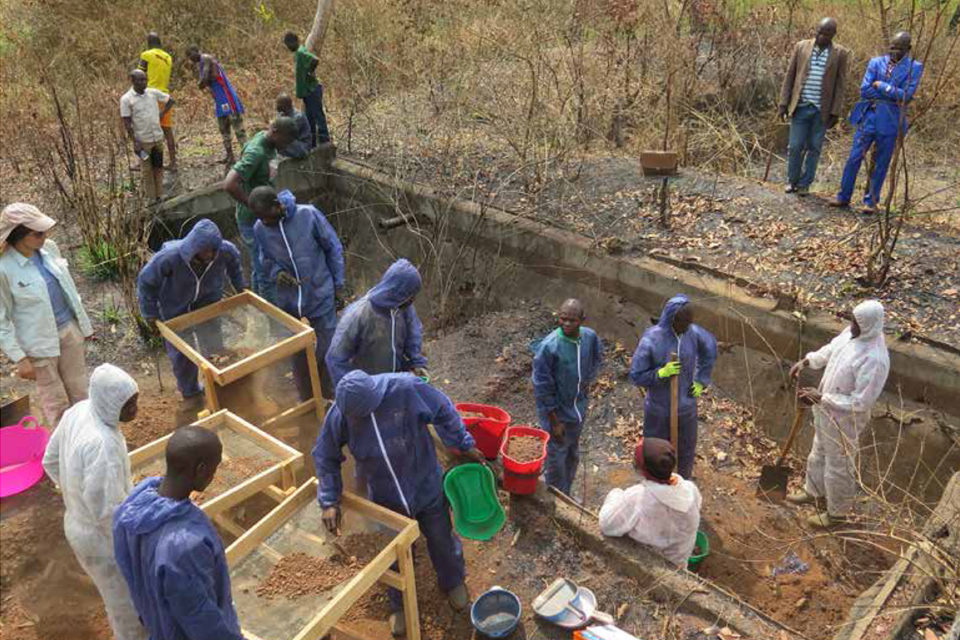
Aug 20, 2020 | News
Despite remarkable efforts to recover and identify human remains in Latin America, there are still thousands of cases where remains have not been identified and returned to their family. Crucially, families still struggle to understand and participate in the forensic process.
To address this issue, el Equipo Argentino de Antropología Forense (EAAF) launched today a Forensic Guide which aims at providing practical and accessible information on the investigation, recovery, and analysis of human remains.
Currently, this publication is only available in Spanish but an English version will be provided in the forthcoming months.
The guide will be particularly useful for people who have no previous forensic knowledge and will contribute towards improving the understanding and participation of victims and civil society organizations in the search for disappeared persons.
The Guide was written by Luis Fondebrider, the executive director of the EAAF and takes into account international standards including the revised Minnesota Protocol on the Investigation of Potentially Unlawful Death (2016).
The ICJ, the Equipo Peruano de Antropología Forense (EPAF) and the Fundación de Antropología Forense de Guatemala (FAFG) provided input during the Guide’s development.
The Guide was launched during a Webinar. The key speakers were Luis Fondebrider from the EAAF; Claudia Rivera from the FAFG and Franco Mora from the EPAF. It was moderated by Carolina Villadiego from the ICJ.
At the launch, all the forensic experts emphasized the central role that the families of disappeared persons must play in the process of investigation, recovery, and analysis of human remains. In particular, it was acknowledged that they not only have key information to find the remains but also, they have driven the processes.
Background
The Guide was produced as part of a regional project addressing justice for extrajudicial killings and enforced disappearances in Colombia, Guatemala, and Peru, which is coordinated by the ICJ.
The aim of the project is to promote the accountability of perpetrators and access to effective remedies and reparation for victims and their families in cases of extrajudicial killings and enforced disappearances in Colombia, Guatemala and Peru – and Latin America more broadly – through effective, accountable and inclusive laws, institutions and practices that also reduce the risk of future violations. The project is supported by the EU European Instrument for Democracy and Human Rights (EIDHR).
The ICJ’s partners include the Asociación de Familiares de Detenidos-Desaparecidos de Guatemala (FAMDEGUA), Asociación Red de Defensores y Defensoras de Derechos Humanos (dhColombia), Equipo Argentino de Antropología Forense (EAAF), Equipo Peruano de Antropología Forense (EPAF), Fundación de Antropología Forense de Guatemala (FAFG), and the Instituto de Defensa Legal (IDL).
Contacts:
Kingsley Abbott, Coordinator of the Global Accountability Initiative, e: kingsley.abbott(a)icj.org
Carolina Villadiego, Legal and Policy Adviser, Latin America, and Regional Coordinator of the Project, e: carolina.villadiego(a)icj.org
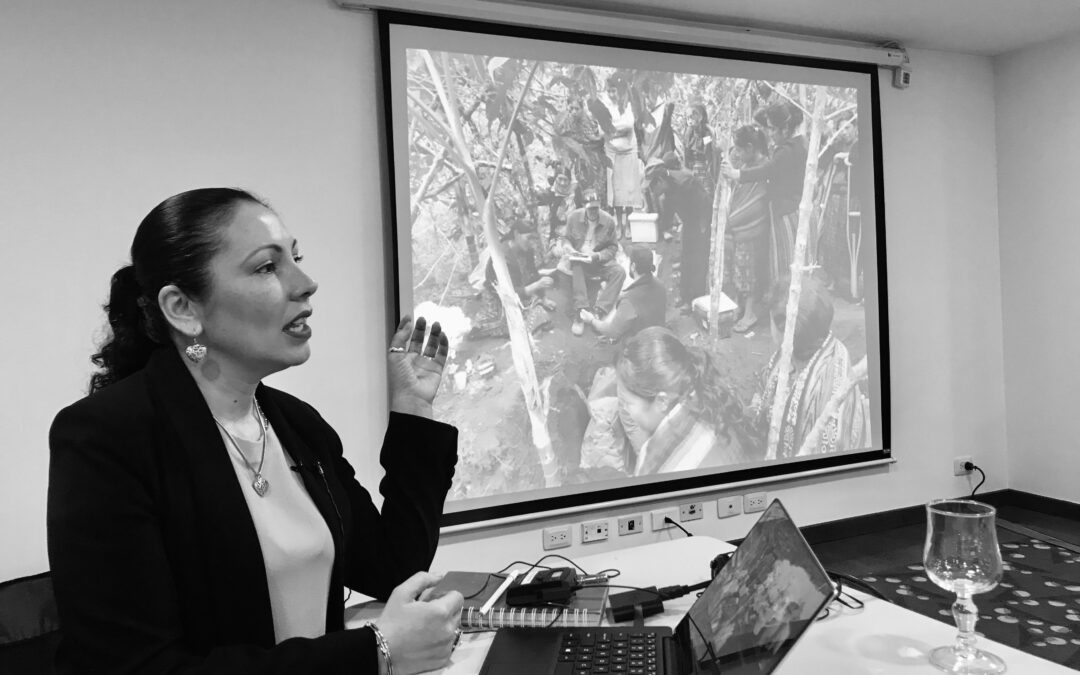
Feb 12, 2019 | News
Today in Bogotá, Colombia, ICJ and its partners launched a new 30-month project under the ICJ’s Global Accountability Initiative entitled, Promoting justice for extrajudicial killings and enforced disappearances in Colombia, Guatemala and Peru.
The aim of the project is to promote the accountability of perpetrators and access to effective remedies and reparation for victims and their families in cases of extrajudicial killings and enforced disappearances in Colombia, Guatemala and Peru – and Latin America more broadly – through effective, accountable and inclusive laws, institutions and practices that also reduce the risk of future violations
The ICJ’s partners include the Asociacion de Familiares de Detenidos-Desaparecidos de Guatemala (FAMDEGUA), Asociación Red de defensores y defensoras de derechos humanos (dhColombia), Equipo Argentino de Antropología Forense (EAAF), Equipo Peruano de Antropología Forense (EPAF), Fundación de Antropología Forense de Guatemala (FAFG), and the Instituto de Defensa Legal (IDL).
Christof Heyns, Director of the Institute for International and Comparative Law in Africa and Professor of Human Rights Law at the University of Pretoria – and a former Special Rapporteur on extrajudicial, summary or arbitrary executions – also joins the project as special adviser.
In carrying out the project the ICJ will conduct general studies on obstacles to impunity in Colombia, Guatemala and Peru, as well as specific documentation of emblematic cases of serious human rights violations. The ICJ will also produce a practitioners’ guide for use by civil society, victims and their representatives on the investigation and prosecution of potentially unlawful death, and a regional guide for forensic experts on the investigation and prosecution of potentially unlawful death. In connection with the project the IJC intends to conduct strategic litigation, trial observations and capacity building activities involving judges, prosecutors, investigators, lawyers, civil society, victim groups and forensic experts.
The project is supported by the EU European Instrument for Democracy and Human Rights (EIDHR).
Contacts:
Kingsley Abbott, Senior Legal Adviser & Coordinator of the ICJ’s Global Accountability Initiative, email: kingsley.abbott(a)icj.org
Rocío Quintero, Legal Adviser, Latin America, email: rocio.quintero(a)icj.org
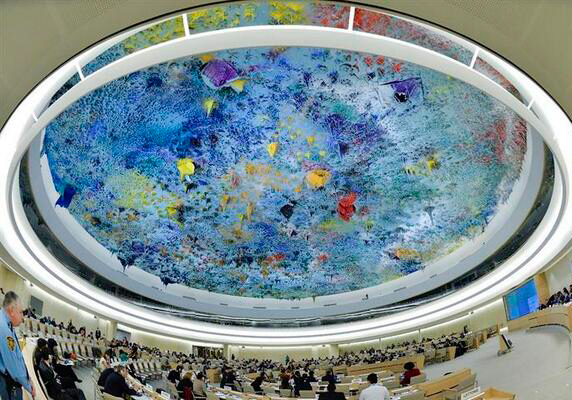
Mar 15, 2018 | Advocacy, Non-legal submissions
The ICJ today spoke at the United Nations on impunity and the situation for human rights in Peru.
The oral statement was made during the discussion at the Human Rights Council of the Universal Periodic Review outcome for Peru. It read as follows (translation from the original Spanish):
“Mr President,
The International Commission of Jurists (ICJ) recognizes the progress made by the Peruvian State in the field of human rights and its openness in relation to the recommendations made in the current cycle of the Universal Periodic Review.
The ICJ regrets, however, that the investigation and punishment of those responsible for the serious human rights violations that occurred during the internal armed conflict have not received the attention they deserve. On the contrary, the fight against impunity has receded with the granting of pardon and presidential grace to former president Alberto Fujimori who was serving a prison sentence for a series of crimes against humanity committed during his term. The presidential grace grants immunity from investigations and prosecutions in course or to be opened in the future.
One of the recommendations (111.97) that Peru accepts with qualifications refers to investigations and reparations to the thousands of women who suffered forced sterilization during the Fujimori administration. The measures of pardon and grace granted would exonerate Fujimori from investigation and punishment for this and other serious crimes. The ICJ urges the Peruvian State to implement the recommendations of the international community with full respect for international standards that prohibit impunity for serious violations of human rights.
Thank you Mr President.”
The ICJ oral statement complements a related written statement by the ICJ at the session.
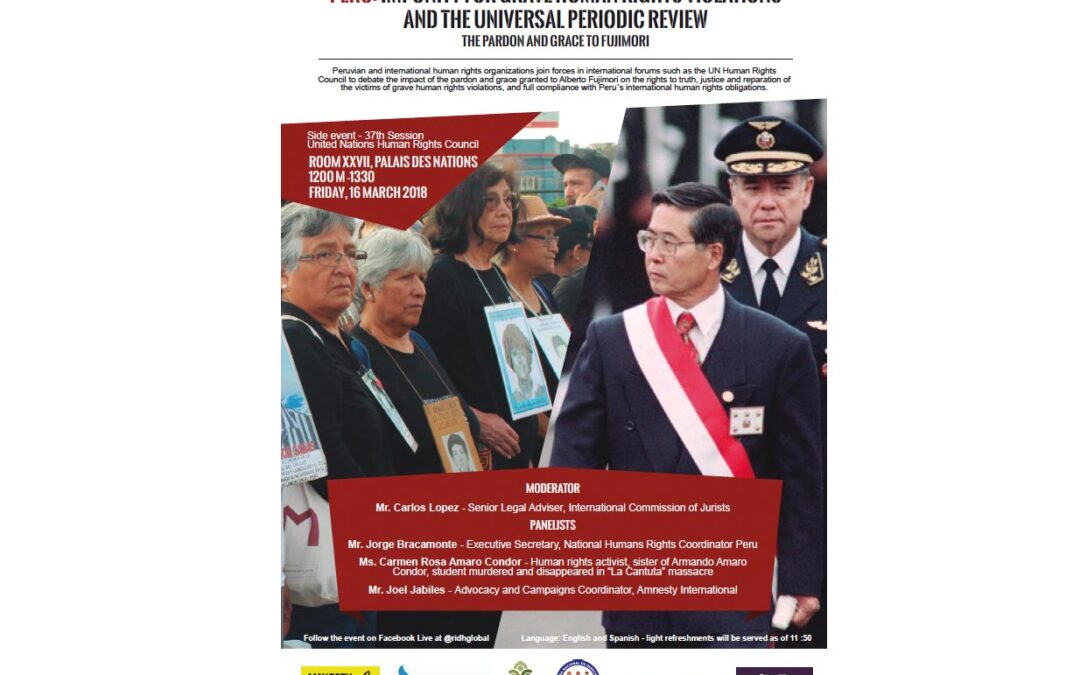
Mar 13, 2018 | Agendas, Events, Human Rights Council, News, Work with the UN
This side event to the 37th Session of the United Nations Human Rights Council takes place on Friday, 16 March 2018, from 12.00 to 13.30, Room XXVII, Palais des Nations, Geneva. It is co-sponsored by the ICJ.
Peruvian and international human rights organizations join forces in international forums such as the UN Human Rights Council to debate the impact of the pardon and grace granted to Alberto Fujimori on the rights to truth, justice and reparation of the victims of grave human rights violations, and full compliance with Peru´s international human rights obligations.
Moderator
- Mr. Carlos Lopez – Senior Legal Adviser, International Commission of Jurists
Panelists
- Mr. Jorge Bracamonte – Executive Secretary, National Humans Rights Coordinator Peru
- Ms. Carmen Rosa Amaro Condor – Human rights activist, sister of Armando Amaro
Condor, student murdered and disappeared in “La Cantuta” massacre
- Mr. Joel Jabiles – Advocacy and Campaigns Coordinator, Amnesty International
Follow the event on Facebook Live at @ridhglobal
Language: English and Spanish – light refreshments will be served as of 11 :50








